Bringing a dog into your family is a heartwarming decision that promises years of joy, companionship, and unconditional love. Dogs quickly become cherished members of our households, filling our lives with laughter, loyalty, and endless cuddles. However, selecting the right dog breed is crucial to ensure a harmonious fit for your family’s lifestyle and home.
This article serves as a comprehensive guide to help you navigate the exciting journey of choosing a family dog. We’ll explore the essential traits that make certain breeds exceptionally well-suited for family life, focusing on characteristics like patience with children, gentle temperaments, and trainability. Our goal is to equip you with the knowledge to find a canine companion that will thrive in your home and become a beloved member of your family for years to come.
Key Considerations When Choosing a Family Dog Breed
More than just picking the cutest puppy, selecting the ideal family dog breed requires careful consideration of your family’s unique circumstances. Think about your activity levels, living space, and the level of commitment your family can realistically provide. Being honest about your family’s lifestyle is the first step in finding the right dog.
Before falling in love with a breed based on looks alone, assess whether a dog truly fits into your family’s daily life. It’s crucial to be realistic about the responsibilities of dog ownership and ensure you’re prepared to meet the needs of your new furry friend.
Ideally, you should look for breeds known for their tolerant and easygoing personalities, especially if you have children. These breeds are typically more adaptable to the energy and sometimes unpredictable nature of kids. However, remember that even the most patient dog needs proper care, training, and socialization to flourish.
As you consider different breeds, keep these key factors in mind:
Temperament: The Cornerstone of a Family-Friendly Dog
Temperament is paramount when selecting a family dog. An even-tempered, patient dog that can handle the typical interactions and energy of children is generally the best choice. Breeds known for their gentle and calm nature, such as Retrievers and Poodles, often make excellent family pets. A good temperament ensures a dog is not easily agitated or reactive, creating a safer and more enjoyable environment for everyone in the family.
Size Matters: Finding the Right Fit for Your Home and Family
Size is another important factor to consider, particularly if you have young children or limited living space. Small to medium-sized dogs are often recommended as the best family dogs, especially for households with younger kids. Larger breeds can be wonderful family pets too, but their size might be overwhelming for small children, and space requirements should be considered. Think about the physical space in your home and yard and how a dog’s size will impact daily life.
Energy Level: Matching Your Family’s Pace
A dog’s energy level is a critical consideration for family harmony. Choosing a breed with an energy level that matches your family’s activity level is essential for the dog’s happiness and well-being. An energetic breed that doesn’t get enough exercise can become restless and potentially destructive.
Ask yourself: can your family, including the children, realistically provide adequate exercise for a high-energy breed? If your family prefers a more relaxed lifestyle, consider mellow companions like a Bichon Frise or Cavalier King Charles Spaniel. Matching energy levels prevents frustration for both you and your dog.
Hypoallergenic Considerations: For Allergy-Sensitive Families
If allergies are a concern for anyone in your family, exploring hypoallergenic breeds is a smart move. While no dog is completely hypoallergenic, some breeds produce less dander and shed less, reducing allergy triggers.
Breeds like Poodles, Bichon Frises, Kerry Blue Terriers, and Maltese are often cited as good hypoallergenic dog breeds for families. If allergies are a significant concern, try to spend time with a dog of the breed you’re considering before bringing them home. This can help determine if they trigger allergic reactions.
Top Dog Breeds Ideal for Families
When it comes to choosing the best dog breed for your family, prioritizing breeds known for their patient temperaments and adaptable energy levels is key. Many breeds are naturally inclined to be child-friendly and thrive in a family environment. Consider these exceptional breeds known for creating joyful and loving households:
- Labrador Retriever
 Labrador Retriever
Labrador Retriever
Labrador Retrievers are synonymous with family-friendly dogs. They effortlessly integrate into bustling family life, with their playful nature and trademark “throw the ball” enthusiasm. Labs are known for their outgoing, patient, and relaxed personalities. With high energy levels, they are fantastic companions for active families. Their legendary patience makes them excellent with children, though supervision is always recommended. Labs are also generally good with other dogs. Be aware they have moderate year-round shedding and require weekly brushing, more during shedding seasons.
- Golden Retriever
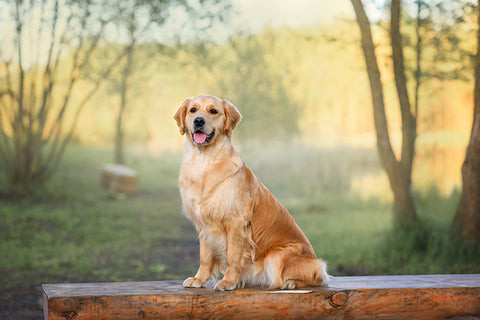 golden retriever
golden retriever
Golden Retrievers are another breed that consistently ranks high as a family favorite. Known for being fun-loving and cheerful, Goldens are always ready for family adventures. Their affectionate, trusting, and devoted personalities shine through in their interactions with children and adults alike. Golden Retrievers are very active and need plenty of exercise, making them ideal for active families. They are excellent with kids and typically get along well with other dogs, especially with supervision. Be prepared for constant moderate to heavy shedding and daily brushing, plus frequent vacuuming to manage their coat.
- Poodle (Standard, Miniature, and Toy)
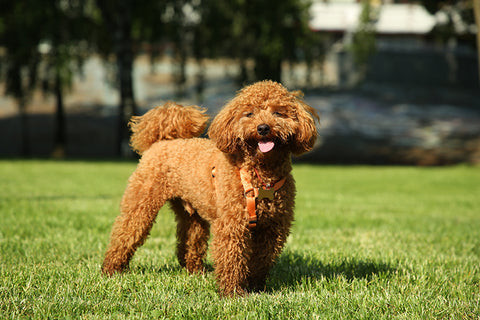 Poodle
Poodle
Poodles, in all their sizes, are remarkably intelligent, energetic, and eager to please, making them wonderful family dogs. Their playful and sometimes silly nature endears them to children. Poodles are also known for being one of the best dog breeds for allergy sufferers due to their minimal shedding. They are trainable, proud, and very smart dogs with high energy levels. Poodles are generally good with children and other dogs, though supervision is advised with other dogs initially. While they shed minimally, they require daily brushing and regular professional clipping to maintain their coats.
- Beagle
 beagle
beagle
Beagles are irresistibly charming and make solid family companions. Their sweet, gentle, and upbeat personalities make them adaptable to both playtime and cuddle time. Beagles have moderate energy levels, making them suitable for families with a moderately active lifestyle. They are known to be good with children and, with early socialization, can get along well with other dogs. Beagles have year-round moderate shedding and require weekly brushing.
- Bernese Mountain Dog
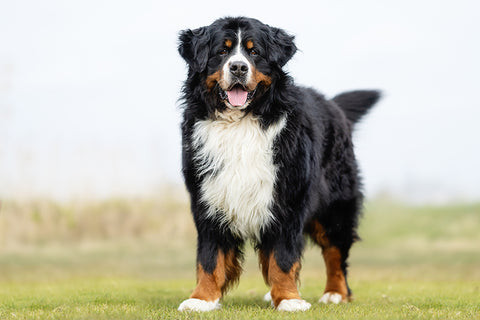 Bernese Mountain Dog
Bernese Mountain Dog
Despite their large size, Bernese Mountain Dogs are gentle giants with affectionate and playful personalities. They are known for their loyalty, intelligence, and gentle nature, making them wonderful family dogs. Bernese Mountain Dogs need a moderate level of activity to stay happy and healthy. They are good with children and generally good with other dogs, though supervision is recommended. They are regular shedders and require weekly brushing.
- Bichon Frise
 Bichon Frise
Bichon Frise
Bichon Frises are like fluffy cotton balls with legs, bringing cheer and delight to any home. Their irresistible plush coat and charming personalities make them popular family dogs. Bichons are playful, cheerful, and perky, adoring children’s laughter and tricks. They have moderate energy levels and are excellent with kids. They are also great with other dogs, especially with supervision. Bichon Frises are minimal shedders and considered hypoallergenic, but require daily brushing and regular haircuts to maintain their distinctive appearance.
- Collie
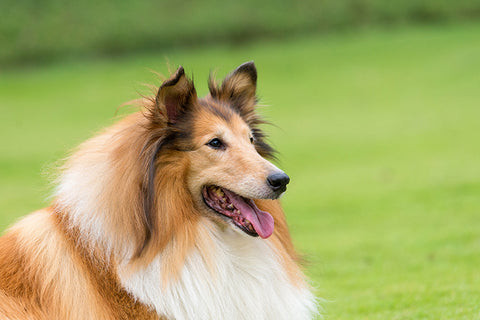 Collie
Collie
Collies, with their herding heritage, form intense bonds with their families, becoming gentle and vigilant guardians. They are loyal, responsive, and protective, active outdoors but composed indoors. Collies need significant stimulation to meet their physical and mental needs, thriving in families that can provide consistent activity. They are generally good with children, though supervision is advised, and with early socialization, they can be good with other dogs. Collies have heavy shedding twice a year and require daily brushing during shedding seasons.
- Newfoundland
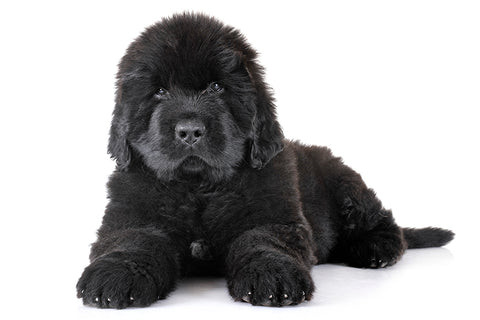 Newfoundland
Newfoundland
Newfoundlands are massive yet mild-mannered dogs, often referred to as “gentle giants.” Their tremendous size belies their sweet and calm temperament. They move gracefully indoors and patiently tolerate the antics of children. Newfoundlands are calm, generous, and obedient dogs with moderate energy levels. They are excellent with children and generally good with other dogs, with supervision. They are heavy year-round shedders and require weekly brushing.
- Boxer
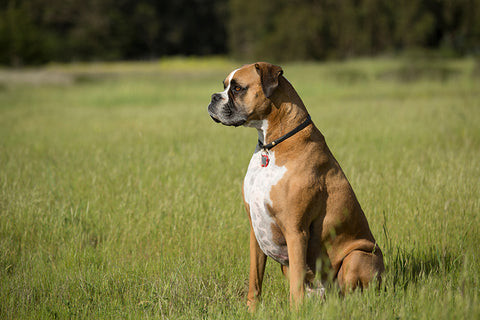 Boxer
Boxer
Boxers are a fantastic choice for families seeking a protective yet silly and fun-loving dog. Their patience, gentleness, and playful nature make them ideal for active households. Boxers are fun-loving, bright, and active dogs with very high energy levels. They are excellent with children and require socialization to be good with other dogs. They have moderate year-round shedding and need weekly brushing.
- Irish Setter
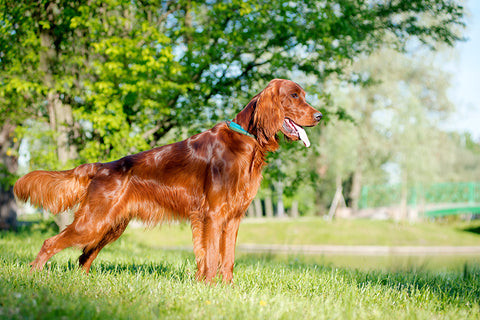 Irish Setter
Irish Setter
Irish Setters are active and fun-loving companions, always alert and enthusiastic. Their rambunctious, clownish, and demonstrative personalities make them entertaining family members. Irish Setters have high energy levels and are good with children, though supervision is recommended. They are also good with other dogs. They have significant year-round shedding and require brushing three times a week.
- Vizsla
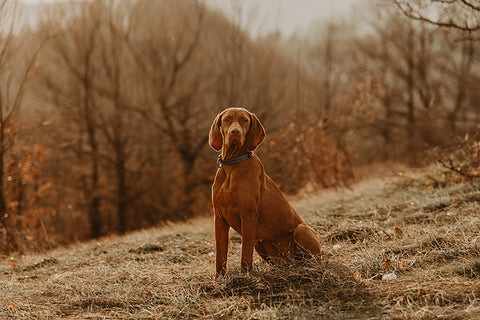 Vizsla
Vizsla
Vizslas are striking dogs known for their gentle and energetic nature. Their lack of an undercoat is a significant advantage for families concerned about shedding. Vizslas are ideal family pets for active children due to their high energy levels. They are gentle and energetic, good with children (with supervision), and generally good with other dogs (also with supervision). They have low shedding and require weekly brushing.
- Shih Tzu
 Shih Tzu
Shih Tzu
Shih Tzus are easygoing, affectionate, and trusting dogs, making them wonderful companions. They are cuddly yet adaptable to various activity levels, rarely needing intense exercise. Shih Tzus are friendly and bright with moderate energy levels. They are excellent with children and good with other dogs. They have high shedding and require regular brushing.
- Welsh Corgi (Pembroke or Cardigan)
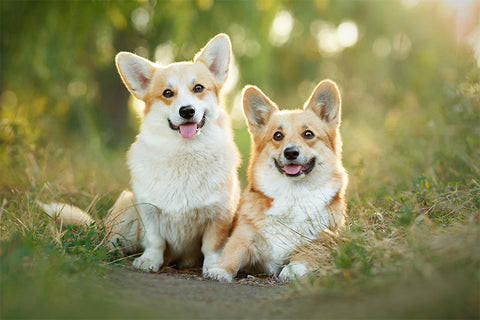 Welsh Corgi
Welsh Corgi
Originally bred to herd cattle, Welsh Corgis retain their spunky and bold personalities. They enjoy playful interactions with respectful children and thrive when included in family activities. Corgis are bold, smart, and vocal dogs with moderate energy levels. They are good with children with supervision and require socialization to be good with other dogs. They are heavy year-round shedders and need regular brushing.
- Samoyed
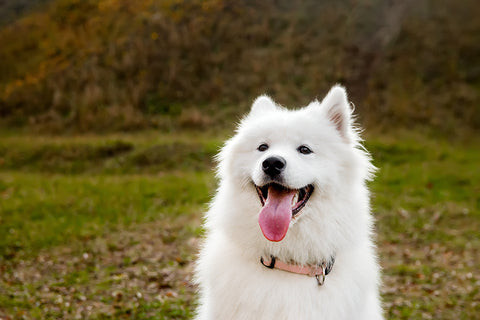 Samoyed
Samoyed
Samoyeds are known for their distinctive “Sammy smile,” reflecting their amiable and friendly temperament. They adapt well to family routines and are remarkably loyal companions. Samoyeds are friendly and gentle with high energy levels. They are good with children, though supervision may be needed, and generally good with other dogs. They have high shedding and require brushing twice a week.
- Border Collie
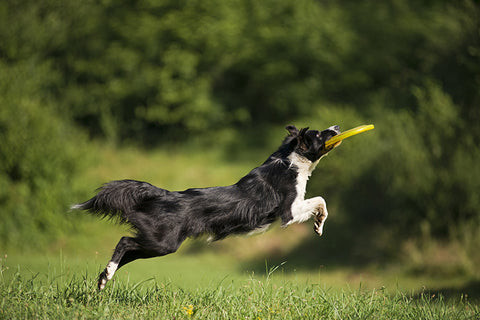 border collie
border collie
Border Collies are exceptionally intelligent and energetic dogs. They require intense daily mental and physical stimulation to thrive. While incredibly smart and trainable, their high energy and need for constant activity might be best suited for experienced dog owners and very active families. Border Collies are energetic, smart, and intense dogs with very high energy levels. They are excellent with children with supervision and good with other dogs with socialization. They have seasonal moderate shedding and require weekly brushing.
Which Dog Breeds Are Known for Being the Friendliest?
While most well-socialized dogs can become wonderful companions, some breeds are particularly known for their trusting and outgoing nature, especially towards unfamiliar people. These breeds often excel as family dogs due to their inherent friendliness:
-
Labrador Retriever: It’s no surprise that Labrador Retrievers consistently rank as one of the most popular dog breeds. Their eagerness to please and love for people and other animals is unmatched. Their patience, gentle nature, and overall friendliness make them a top choice for families.
-
Golden Retriever: Sharing many temperament traits with Labrador Retrievers, Golden Retrievers are equally friendly and tolerant. They readily make friends and are typically always happy and approachable, embodying the ideal friendly family dog.
-
Cavalier King Charles Spaniel: Few can resist the charm of a Cavalier King Charles Spaniel. Their mild-mannered and gentle nature makes them wonderful companions for everyone, from young children to older adults. They are known for their affectionate and adaptable personalities.
-
Irish Setter: Beneath their elegant red coat lies an incredibly outgoing and enthusiastic heart. Irish Setters eagerly greet new people with joyful exuberance. While friendly, they do require moderate to high exercise levels to prevent boredom and potential mischief.
-
Mixed Breed Dogs: The temperament of mixed-breed dogs can vary depending on their lineage. However, many mixed breeds inherit the friendly traits of popular family breeds like Labradors or Retrievers, making them excellent and often more resilient family pets.
Low-Maintenance Family Dog Breeds: Easier Options for Busy Families
For families with busy lifestyles, choosing a low-maintenance dog breed can be a practical and beneficial decision. Low-maintenance doesn’t mean neglect; it refers to breeds with fewer demanding needs in areas like grooming, exercise, and training. Consider these breeds if you’re looking for a family dog that fits into a more relaxed routine:
Small to medium-sized breeds, in general, tend to be lower maintenance. Breeds like Beagles, Bichon Frises, and Shih Tzus often require less intense exercise compared to larger, more energetic breeds. Poodles, while requiring professional grooming, are low-shedding, which can be a significant benefit for some families.
Remember that “low-maintenance” is relative. All dogs need regular walks, playtime, feeding, and veterinary care to stay happy and healthy. Low-maintenance breeds simply require less in certain areas, making them suitable for families with less time to dedicate to intensive dog care.
Essential Tips for Caring for Your Family Dog
Bringing a dog into your family is a rewarding experience, and providing proper care is essential for their well-being and happiness. Here are some key tips to ensure you’re creating a loving and supportive environment for your new family member:
-
Create a Clean and Safe Home Environment: Dog-proof your home by identifying and removing potential hazards. Secure loose wires, store cleaning supplies and medications out of reach, and ensure your yard is securely fenced. Think from a dog’s perspective to anticipate potential dangers.
-
Stick to a Reliable Routine: Dogs thrive on routine. Establish a consistent schedule for feeding, walks, playtime, and bedtime. Consistency helps with training and provides your dog with a sense of security. Using quality dog food and sticking to a consistent feeding schedule is also crucial.
-
Make Veterinary Care a Priority: Regular veterinary check-ups are vital for preventative care. Keep vaccinations up-to-date, and ensure your dog receives necessary flea, tick, and worm prevention. Promptly address any health concerns with your veterinarian.
-
Engage Children in Dog Care (with Supervision): Teach children how to interact respectfully with the dog. Supervise all interactions between children and dogs, especially young children. Involve children in age-appropriate tasks like filling water bowls or gentle petting to foster a positive bond.
-
Provide Proper Diet and Exercise: Feed your dog a high-quality dog food appropriate for their age, breed, and activity level. Follow veterinarian recommendations for feeding amounts. Ensure your dog gets adequate physical and mental exercise daily to prevent boredom and maintain a healthy weight.
Conclusion: Finding Your Perfect Family Dog
Adding a dog to your family is a significant decision that requires careful consideration. By thoughtfully evaluating breed traits, temperaments, and your family’s lifestyle, you can find a perfect canine companion that will bring immeasurable joy and love into your home. The effort invested in choosing the right dog breed and providing proper care will be repaid tenfold with years of wonderful memories and unwavering companionship from your new furry family member.

